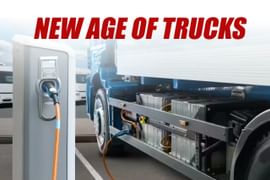Truck drivers spend most of their lives on the road. They drive 12 to 18 hours a day, eat when they can and sleep where they can find room. Cabins are turned into bedrooms. Highways are turned into homes. The body conforms; the mind does not.
As per the Ministry of Road Transport and Highways (MoRTH), India recorded 1.68 lakh road fatalities in 2022, with trucks being involved in close to 12% of them. Experts identify fatigue, deprivation of sleep and mental distraction as silent reasons. These numbers are not just identifying accidents; they indicate distress.
Understanding the Mental Strain
Psychological well-being in the transportation business is tenuous due to its design, which has room for little concern. The causes are numerous and deeply intertwined.
1. Chronic Fatigue
Long hours driving lead to perpetual fatigue. Sleep patterns are disrupted. The body slows down but not schedules. Fatigue wears down patience, vigilance and emotional stability.
2. Cost Burden
Truck drivers are paid by trip, not by the hour and delays can cause losses. Increasing fuel prices and tolls exacerbate the pressure. Financial stress fuels anxiety and rage.
3. Isolation
Alone days on roads isolate drivers from loved ones. Solitude becomes a permanent friend. Gradually, it becomes depressing.
4. Occupational Stress
Traffic congestion, breakdowns and police stops test their mettle. Each journey becomes a mental struggle. Every hitch contributes to psychological burden.
5. Social Stigma
Psychological distress is taken lightly as weakness. Drivers refrain from talking, lest they be judged or sacked. Silence, thus, weighs more than the load.
When Stress Becomes Dangerous
Mental fatigue does not end at the brain. It impacts every choice on the road. A study by SaveLIFE Foundation (2023) revealed that 20% of truck accidents are associated with fatigue or distraction. More than 50% of drivers confessed to driving even after feeling sleepy and two-thirds of them went without meals to achieve their targets. An exhausted driver responds slower, overestimates turns and cannot stay awake. The consequence can be fatal.
Stress also takes a toll on the body. Hypertension, heart disease and substance abuse become prevalent. Alcohol and stimulants appear to be a fix but they only worsen fatigue and moodiness.
What Drivers Can Do for Themselves
Drivers can safeguard their minds with small but consistent habits. Each step builds strength.
- Rest regularly: Sleep rejuvenates clarity and alertness. Even brief naps lower risk.
- Eat on time: Regular meals maintain energy levels.
- Stay connected: Calling family or fellow drivers breaks isolation.
- Avoid stimulants: Substances harm sleep and mood over time.
- Move often: Stretching during stops improves blood flow and reduces stiffness.
- Seek help early: If sadness, anxiety, or restlessness persists, talking to a doctor helps. Healing begins with a single conversation.
Conclusion
Truckers are not merely goods carriers; they are India's growth carriers in silent motion. Their mental well-being, however, is a silent crisis. The mind behind the wheel must be rested, respected and recognized. Taking care of the mental health of truck drivers is more than kindness; it is imperative. A peaceful, wakeful driver guarantees safety for all on the road. The resilience of India's logistics is not just about machines or roads but about the individuals who keep them alive.
For more articles and news, stay updated with 91trucks. Subscribe to our YouTube channel and follow us on Facebook, Instagram and LinkedIn for the latest videos and updates from the automotive world!
Related Stories:
From Bullock Carts to EV Trucks: A Journey Through India’s Truck Evolution









